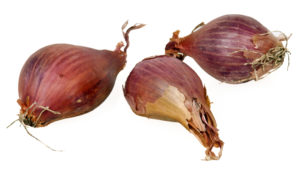Shallots: The shallot is a type of onion, specifically a botanical variety of the species Allium cepa.
Uses
- Used in culinary.
Benefits
- Act as Antioxidant Agent
Perhaps the best nutritional bonus of shallots is the high and diverse content of antioxidant compounds, including quercetin, kemferol, and various sulfuric antioxidants. These antioxidants are released when the cell surface is disrupted, which happend during slicing or crushing, similar to garlic. When these antioxidants are released, they form another valuable compound called allicin. This powerful compound helps to reduce cell mutation and various cancers. Studies have connected shallots to a reduction in lung and oral cancers, as well as stomach, colorectal, and breast cancer.
- Improve Circulation & Metabolism
The mineral content of shallots is typically higher than that of onions, including iron, copper, and potassium. Iron and copper can help to boost circulation in the body by stimulating the production of red blood cells. With more RBC in the blood stream, blood circulation increases, bringing more oxygen to important areas of the body and increasing energy, vitality, cell regrowth, healing, and metabolism.
- Lower Cholesterol & Improve Heart Health
Allicin, the compound formed when shallots are sliced and diced, has been directly linked to regulating cholesterol levels in the body. Allicin actually inhibits an reductase enzyme that is produced in the liver, which is the enzyme that controls cholesterol production. By lowering total cholesterol levels in the body, shallots can help prevent atherosclerosis, coronary heart disease, heart attacks, and strokes.
- Lower Blood Pressure
The combination of potassium, a well known vasodilator, and the action of allicin, which releases nitric oxide in the body, blood pressure is significantly decreased. A vasodilator relaxes the walls of the blood vessels and allows blood to flow more freely. This prevents clotting and stress on the cardiovascular system, further boosting heart health.
- Control Diabetes
Two of the phytochemical compounds found in shallots, allium and allyl disulfide, have anti-diabetic properties, meaning that they help to regulate the levels of blood sugar in the body. This can be very helpful for diabetics who need to keep their blood sugar levels under control.
Cautions
There are no common allergies to shallots, like most members of that species (onions and garlic). However, rare allergies do exist, so monitor your body and consume shallots in moderation.
Interactions
Unknown, please consult with your doctor!
Other names
n/a
References
Source: Wikipedia, https://en.wikipedia.org/wiki/Shallot#Culinary_uses
OrganicFacts, https://www.organicfacts.net/health-benefits/vegetable/shallots.html#Health_Benefits_of_Shallots

